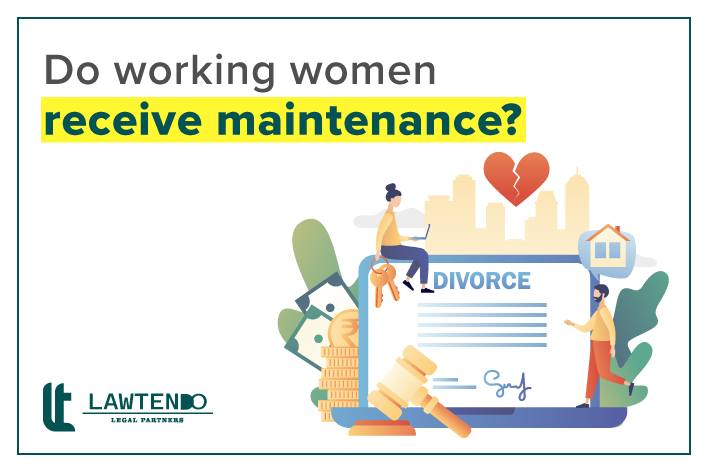Do Working women receive Maintenance?

Date : 09 Feb, 2023
Post By Pranjal Jain
Do working women receive maintenance ?
Divorce and separation cases had skyrocketed in the previous decade. Different laws in India, like Section 125 of the 1973 Criminal Procedure Code (CrPC), have provisions for maintenance: Section 24 of the Hindu Adoption and Maintenance Act of 1956 and personal laws such as the Shariah Law, among others. These laws say that women can claim the benefit even before they divorce during their separation. Her claim for maintenance includes her minor children as well. In the event of a woman's remarriage or conversion to another religion, she will no longer be eligible for maintenance under these laws. Here, we will discuss if a working woman has the right to maintenance.
What exactly is Maintenance?
It would be appropriate to discuss the legal meaning and scope of maintenance prior to addressing the issue at hand. The Hindu Adoption and Maintenance Act of 1956 defines maintenance as
(i) Ensuring that everyone has access to housing, food, clothing, education, and medical care in every circumstance.
(ii) In the case of a daughter who is not married, any reasonable costs incurred as a result of her marriage.
Legal Provisions
1. In terms of the law, Section 24 of the Hindu Marriage Act of 1955 gives the party who doesn't have enough money to support themselves the right to ask the other party for maintenance. It is pertinent to note that Section 24 provides husband and wife with the right to seek interim maintenance while the matrimonial dispute is pending.
2. Section 125 of the CrPC, among other things, gives the wife who doesn't have enough money to support herself the right to ask her husband for support if he won't take care of her. In contrast to section 24 of the Hindu Marriage Act, this section does not provide husbands with any benefits. However, because it is not restricted to a particular religion, this provision is available to all wives, regardless of their religion.
3. A wife has the right to ask her husband for support under Section 18 of the Hindu Adoption and Maintenance Act of 1956.
4. The Magistrate can issue an interim and ex parte order qua maintenance to the wife under Section 23 of the Protection of Women from Domestic Violence Act, 2002 (the "DV Act") if the wife has been the victim of domestic violence or there is a possibility that the husband (or any other respondent) will commit an act of domestic violence.
5. In addition, the wife is entitled to the benefit of Section 36 of the Special Marriage Act of 1954, which entitles her to seek maintenance from her husband during the duration of the divorce, provided that she lacks sufficient resources to support herself.
Case Laws
At first, there was a misconception that a working woman is not entitled to maintenance because she earns enough to support herself. Now, it is clear from the rulings in cases like Bhagwan v. Kamla Devi and Chaturbhuj v. Sita Bai that she is entitled to maintenance despite earning money. In this regard, the Supreme Court of India has ruled that an estranged woman can claim maintenance from her husband if her efforts to earn a monthly income are insufficient to cover her needs. It also makes it clear that a wife can apply for maintenance even if she is “unable to maintain herself.” This does not mean that she must be completely destitute to apply for maintenance.
The Delhi High Court has clarified a few more points, such as the husband’s right to refuse to pay maintenance because he is unemployed. Under Section 19 of the Hindu Adoptions and Maintenance Act of 1956, Indian law also allows for the reimbursement of interim maintenance costs for proceedings even while those proceedings are in progress.
Case where the wife was earning more than her husband
In the case of Amit Kumar vs. Navjot Dubey, the High Court of Punjab and Haryana refused to overturn the lower court's decision that the wife who earned more than her husband was entitled to maintenance pendent lite under section 24 of the Hindu Marriage Act, 1956. She was, however, looking after her two children. Through the aforementioned order, the High Court confirmed working wives' right to maintenance.
If a man needs support
While the judiciary supports women and helps them get maintenance, it also helps protect the rights of men. Recently, the courts of India passed reverse orders which compelled wives who earned substantial amounts to pay maintenance to their husbands if they left the marriage without a reason.
Why Lawtendo?
Lawtendo is a platform through which we help people find, consult, and hire lawyers. We work around the clock to provide customers with the best lawyers who meet their needs. We collaborate with a wide range of lawyers whose specialities include property possession delays, money recovery, and. cheques, We also assist in areas involving court marriages, as well as divorce and registration, will contract and drafting, labour issues, and builder disputes. We also provide information on all these topics, so that in the hour of need, all your legal queries can be answered in one place. Lawtendo is a hassle-free platform that puts in a lot of effort to ensure that you, the client, have the best legal information and lawyers at your disposal.





